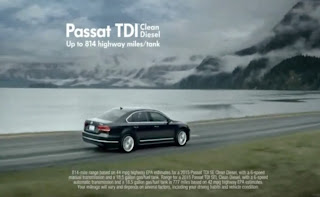Advertising may be judged unfair and/or deceptive if there is a literal or even implied representation, omission or practice that is likely to mislead consumers and if it is reasonable to conclude consumers may rely on the advertising when deciding whether to purchase the product or service in question.
The recent events concerning Volkswagen diesel automobiles illustrate the FTC's responsibilities concerning advertising claims.
In 2015, national television advertising for the Volkswagen TDI Clean Diesel products has touted at least three highly specific claims concerning the performance of the VW diesel engine: rapid acceleration with 236 foot pounds of torque, high efficiency with 44 highway miles per gallon of fuel, and convenience with 814 highway miles per tank full of fuel.
However, it has now come to light that as many as 11 million Volkswagen cars worldwide are fitted with the Volkswagen Type EA 189 engines that are showing material performance deviations between their actual road use and the advertising claims Volkswagen has been making to sell these automobiles.
This is the basis for concluding Volkswagen has been making deceptive and/or unfair advertising claims for its recent diesel automobiles. It now appears the VW cars in question may only deliver the promised performance claims because the mandated pollution control mechanisms are being subverted during the owners' everyday use of their cars.
The recent Volkswagen diesel engine advertising can been seen as deceptive in that VW has made specific claims for performance that do not reasonably accord with the normal use of the automobiles in question.
This Volkswagen advertising can also be seen as unfair in that the claims made by Volkswagen cannot be easily independently judged by the buyers themselves. Most car buyers are not automotive engineers with their own sophisticated testing facilities. These buyers had to rely on the information supplied by Volkswagen which has subsequently been shown to have been both incorrect and the result of engineering practices that did not report everyday performance.
Advertisers know they are responsible for possessing truthful evidence for the claims they make before any advertising claim is shown to the public. That has been the law of our land for quite some time. It should be no surprise to Volkswagen management.
Also, the Federal Trade Commission has responsibilities for ongoing monitoring and review of advertising claims. The FTC guide for mileage claims in advertising states that advertisers must clearly and conspicuously disclose any distinctions in "vehicle configuration" and other equipment affecting performance between automobiles tested in non-EPA tests and the EPA tests. Mechanisms and software to deceive EPA testing would certainly be seen as resulting in a non-EPA test. This incident suggests the FTC might usefully ramp up its monitoring for advertising substantiation.
Indeed, these events point to questions about the appropriateness of corrective advertising so that consumers are informed of the manner and extent VW's corporate behavior. Should corporations be allowed to move forward on the basis of ill-gotten gains in the marketplace, or does marketplace fairness call for a resetting of consumer perceptions of the VW brand to accord with the full extent of the company's deceptive and unfair business practices? Is this brand "too big to fail?" or will transparency and marketplace fairness rule the day?
Copyright © 2015 by John Eighmey. All Rights Reserved.



